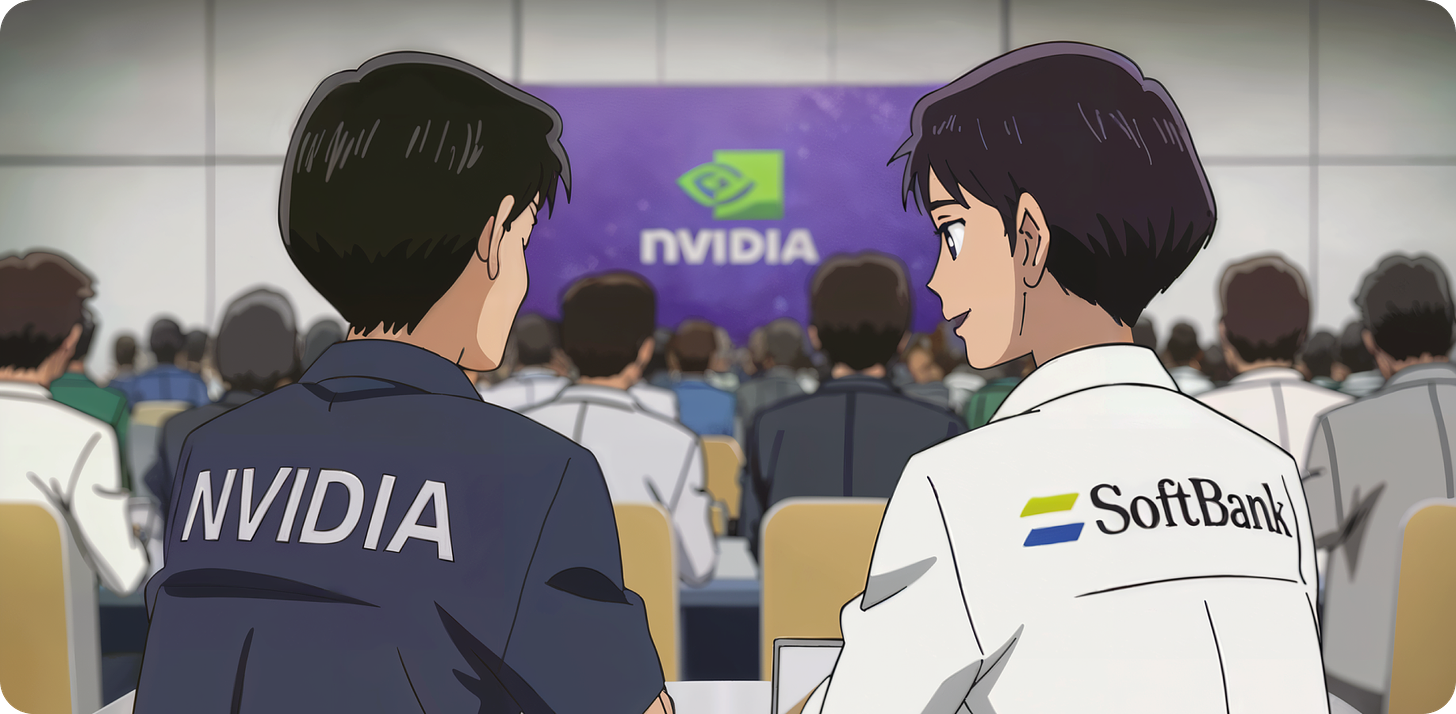In today’s edition:
AI Friends, Nvidia’s Jensen Huang & SoftBank’s Masa Son
Singapore’s Peak XV, Lightspeed, & RazorPay partner up to fund startups
Korea’s Twelve Labs is the World’s #1 AI Video Understanding Startup
More Asia Startup News
🔥 AI Friends, Nvidia’s Jensen Huang & SoftBank’s Masa Son
The Scoop: At the NVIDIA AI Summit Japan 2024, held November 12–13 in Tokyo, NVIDIA CEO Jensen Huang and SoftBank CEO Masayoshi Son announced a collaboration to build Japan's most powerful AI supercomputer. The system will utilize NVIDIA's Blackwell platform (the latest & greatest chip designs), featuring a fleet of DGX B200 systems. With the USA having 6 of the world’s top supercomputers, it’s an operating for Japan to catch up.
Fun Facts:
In addition to the supercomputer announcement, at the event, NVIDIA and SoftBank also successfully piloted a system called “AI-RAN,” the world's first telecom network combining AI and 5G. This breakthrough allows AI models to process real-time data at the edge of the network—such as optimizing signal quality, predicting maintenance needs, or enabling advanced services like personalized user experiences—while simultaneously delivering 5G connectivity. Projections suggest it could generate $5 in revenue for every $1 invested in AI-RAN infrastructure, driven by significant efficiency gains.
After a slow couple of years, Japan's AI startup ecosystem is finally accelerating, with over 370 AI-driven startups participating in NVIDIA's Inception program at the event, and a significant number of developers from NVIDIA’s community of 250,000 strong participating via an online video stream of the AI Summit.
Why It Matters: The collaboration between NVIDIA and SoftBank marks a significant milestone in Japan's AI development, positioning the country as a leader in AI and telecommunications convergence. The deployment of the AI-RAN network demonstrates AI's potential to enhance 5G networks, offering new revenue streams and improved services that could be lucrative for the two companies.
🚀 Singapore’s Peak XV, Lightspeed, & RazorPay partner up to fund startups
The Scoop: Razorpay, in collaboration with Peak XV Partners and Lightspeed, has launched the 'Razorpay Venture Investment Program' to invest in early-stage B2B startups across sectors including fintech, e-commerce, retail, healthcare, and logistics. The program aims to invest up to $1 million in 10–15 pre-seed to Series A SouthEast Asian & Indian startups on an annual basis.
Fun Facts:
The program targets early-stage B2B startups, offering not only funding but also access to Razorpay's technology stack, deep-discounts on startup credits, and integration support.
With three equal partners (Razorpay, Peak XV, and Lightspeed), startups will access a combined expertise of $5 billion+ in funds managed globally, amplifying their growth potential.
The program's portfolio startups have the opportunity to leverage Razorpay’s tech stack, which supports $100 billion+ in annual payment volume, offering unparalleled scalability for payment solutions.
Why It Matters: This partnership between Razorpay, Peak XV, and Lightspeed represents a strategic move to strengthen India & SouthEast Asia’s B2B startup ecosystem. It’s a rare move with 2 venture firms (Peak XV & Lightspeed) collaborating with a large technology company (RazorPay) to create a new type of fund.
The only recent comparison, I can think of, is with Anthropic (an AI startup) partnering with Menlo Ventures (a US VC Firm) to launch a $100 million fund to invest in startups building products on top of Anthropic’s API infrastructure.
🧠 Korea’s Twelve Labs is the World’s #1 AI Video Understanding Startup
The scoop: Meet Twelve Labs, a Korean startup on the fast track to unicorn status, with the industry-standard for AI Models that understands video contant. Valued at over $250 million and having raised $77 million in funding (including $50 million from Nvidia, Samsung, and Intel), they're tackling the massive challenge of making video content searchable and analyzable.
To put how large this industry is into perspective, more than 500 hours of video are uploaded to YouTube every minute, Zoom has surpassed 300 million daily video-meeting participants, and TikTok users average 58 minutes a day on the app.
Their two flagship models, Marengo and Pegasus, are gaining recognition as industry standards. Marengo creates vector embeddings for text, images, and audio, enabling sophisticated search capabilities, while Pegasus provides detailed video analysis and generates rich metadata. The company has already secured major clients like the NFL, demonstrating real-world applications of their technology.
The team:
Jae Lee (CEO): Computer Scientist from UC Berkeley (Top 5 STEM globally), former Head of Data Science at Korea's National Defense Ministry
Dave Chung (Head of Korea Business): Business Administration graduate from Yonsei University, successful blockchain startup founder
Aiden Lee (CTO): Computer Scientist from Brown University, former Machine Learning Research Lead at Korea's National Defense Ministry
Soyoung Lee (Head of US Business): Business Administration graduate from Korea University, PwC alumni
SJ Kim (Head of Engineering): Computer Scientist from Sungkyunkwan University, former Software Engineering Lead at Korea's National Defense Ministry
Bull case: Twelve Labs is positioned perfectly to capitalize on the exponential growth of video content. Their Marengo model could revolutionize streaming services like Netflix, replacing endless scrolling with precise, natural language searches such as "show me K-dramas with love triangles and fight scenes from before 2015." The Pegasus model could dramatically improve CCTV footage analysis, enabling real-time threat detection and sophisticated search capabilities across thousands of cameras.
Their technology has already proven valuable in sports and media, as demonstrated by their NFL partnership, where they can instantly locate specific moments in vast video archives. Their victory at the ICCV VALUE Challenge, beating tech giants like Google and Alibaba, demonstrates their technical prowess, while strong backing from industry leaders like Nvidia, Samsung, and respected VCs suggests significant growth potential.
Bear case: The competition in video AI is intensifying rapidly. Tech giants like Google (with its MUM model), Microsoft, and Amazon are investing heavily in similar technologies, with several advantages: they have access to vast amounts of training data through their existing platforms, superior computing infrastructure, and can offer integrated solutions through their cloud platforms (GCP, Azure, AWS).
I should note that, at the current moment, if I surveyed founders in Silicon Valley who are building AI applications, the majority would pick Twelve Labs as the current “state-of-the-art” for video understanding models.
However, with competition heating up, they'll have to compete like Korean soccer star Son Heung-min to keep a sustainable edge ツ
🇯🇵 Japan NewsFPT, a Vietnamese tech firm, has partnered with Nvidia to launch an AI factory in Japan, acting as a hub for AI development and innovation. Think of this as a commitment between the two companies to fund the ecosystem together.
SoftBank Vision Fund's Co-CEO Rajeev Misra steps down. Despite this change, the fund reports a strong recovery with $3.96 billion in gains for the fiscal second quarter ending September 30.
🇰🇷 Korea NewsSouth Korea intensifies the chip race by unveiling a $9.9 billion support package for its semiconductor industry, aiming to maintain global competitiveness. Shortly after, Japan additionally announced a competing $65 billion subsidy plan for its domestic chip sector, intensifying competition between the nations.
NAVER's group-based social media platform, BAND app, surges to 6 million U.S. users, recording 20% year-over-year growth. The app is gaining traction among school and sports communities for its group communication features.
🇮🇩 Indonesia NewsGoTo & Indosat introduce a language model ecosystem called Sahabat-AI to understand and process local dialects. This could be seen as a friend or foe to other local competitors such as Reka AI or AI Singapore’s SEA-LION.
The Indonesian government announced a new sovereign wealth fund, with a similar structure to Singapore's highly successful Temasek Holdings (which manages over $300B in state assets and invests in promising global companies).
🇨🇳 China News TikTok considers introducing Quibi-style minidramas to broaden its appeal, following the success of similar content on Douyin (the Chinese version of TikTok). Meanwhile, ByteDance's valuation has reached $300 billion, reflecting strong market confidence despite U.S. ban uncertainties.
🇸🇬 Singapore News FTX Co-founder Gary Wang developed a fraud detection tool for prosecutors while under investigation in Singapore and the U.S. for his involvement in the FTX collapse. This is a fascinating instance of Wang using his computer science technical abilities for good, instead of continuing down the path of darkness.










